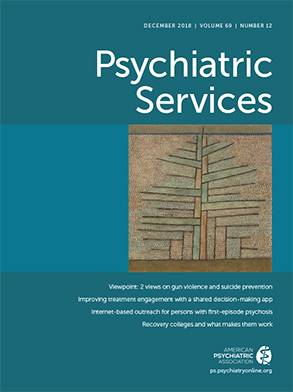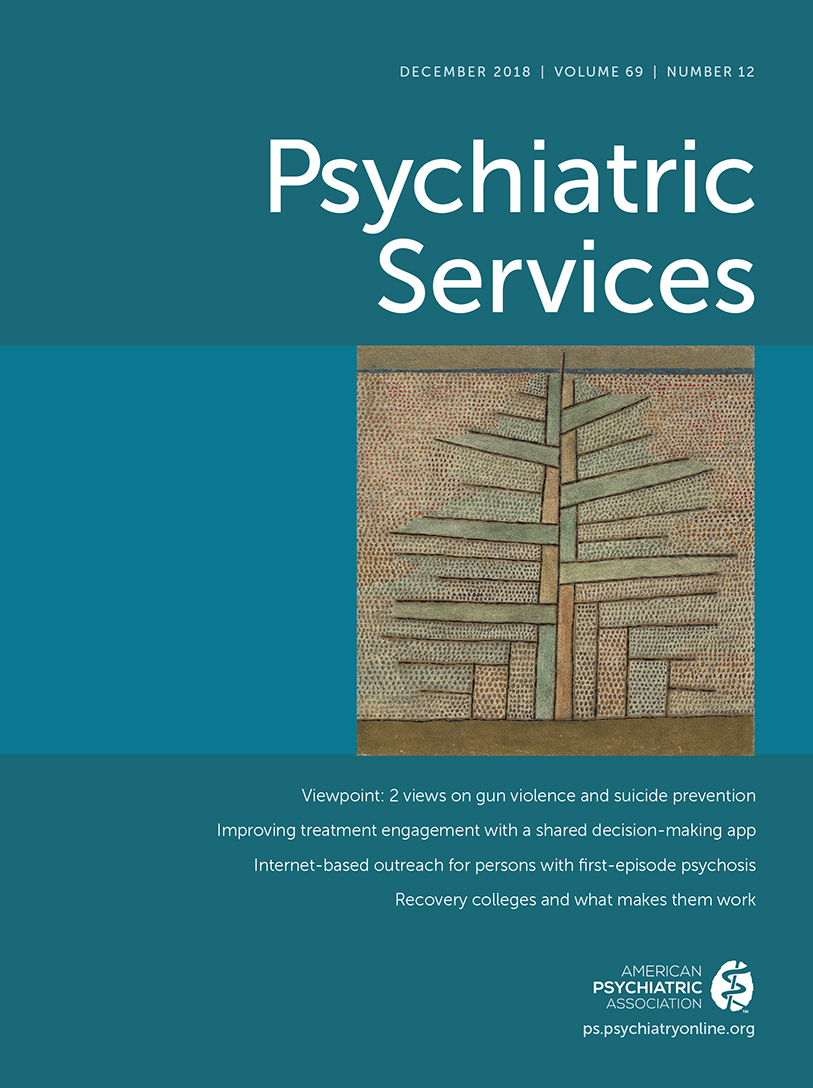Depression is highly prevalent in the perinatal period; up to 20% of women experience depressive symptoms during pregnancy and postpartum, and several organizations recommend screening for perinatal depression (
1). Notably, such screening usually occurs in primary care or obstetric settings, where access to psychiatrists may be limited. Although primary care physicians and obstetricians often feel comfortable initiating depression treatment, they may perceive that management of other disorders, such as bipolar disorder, is more complex. Because up to 20% of women screening positive for depression in the perinatal period may have bipolar disorder, depression screening alone may result in inaccurate diagnosis of unipolar depression among patients with bipolar disorder (
2). Undiagnosed bipolar disorder is associated with a higher risk of suicide; higher rates of socio-occupational dysfunction; high economic burden; and in the perinatal period, a higher risk of postpartum psychosis, which can be associated with suicide and infanticide (
3). Treatments for major depression, such as antidepressant medications, can be ineffective or lead to poor outcomes among women with bipolar disorder (
4). Therefore, it is important to accurately identify women with bipolar disorder.
Primary care and prenatal providers who screen for depression need additional clinical supports to identify and manage the treatment of women with bipolar disorder, because management is complex and follow-up rates on referrals are low (
5). Understanding existing programs that serve women with bipolar disorder in nonspecialty mental health settings could identify such supports. In this column, we describe programs that support the detection, assessment, and management of bipolar disorder among women in obstetric and primary care settings, and we recommend next steps.
Integrated Perinatal Mental Health Programs
We first describe two integrated perinatal mental health programs and each program’s approach to detection and management of bipolar disorder. Both programs were originally developed to support population-based care of pregnant and parenting women with depression and subsequently extended their scope to include evaluation and treatment of women with a likely diagnosis of bipolar disorder. We analyzed deidentified data collected for quality improvement, which did not require institutional review board review or patient consent.
The Mental Health Integration Program (MHIP) for High Risk Moms in Washington State uses the evidence-based collaborative care model to deliver depression treatments to high-risk mothers (low-income women who are either pregnant or parenting a child under age 18) (
6) in federally qualified health centers. A psychiatric consultant reviews the care of a panel of patients and consults to the primary care provider on evaluation and management. A care manager (CM) based in the clinic collects and tracks data, such as symptom measures, in a Web-based registry. CMs also provide outreach to patients and evidence-based psychotherapy for depressive symptoms. Between 2008 and 2017, 897 high-risk mothers received 1,080 episodes of mental health treatment, with an emphasis on providing collaborative care for patients screening positive for depression.
Over time, program clinicians noted challenges with identifying past or current bipolar disorder among women with depression. CM documentation of a bipolar disorder diagnosis was noted for 33 of 897 women (4%). Strategies for further evaluation of bipolar disorder included administration of bipolar disorder screening instruments, such as the Mood Disorders Questionnaire (MDQ) and the Composite International Diagnostic Interview (CIDI) bipolar disorder semistructured interview and follow-up questions (
7) by the CM, and detailed case review by the psychiatric consultant.
A second program, the Massachusetts Child Psychiatry Access Program (MCPAP) for Moms, aims to increase providers’ capacity to address perinatal depression through trainings and toolkits on depression screening, assessment, and treatment; telephone access to perinatal psychiatric consultation for providers serving pregnant and postpartum women; and resources and referrals to link women with individual psychotherapy and support groups (
5). The MCPAP toolkit (
www.mcapapformoms.org) recommends screening for bipolar disorder with the CIDI. The protocol also recommends asking obstetric providers whether they screen for bipolar disorder before every telephone consult. If the patient has a diagnosis of or screens positive for bipolar disorder and the wait time for psychiatric assessment is unacceptably long, the MCPAP psychiatrist sees the patient for a one-time face-to-face consultation and makes recommendations to the obstetric provider. Among the 2,547 telephone consultations completed in the first 3.5 years, 463 (18%) involved patients who reported bipolar illness to their provider, had a prior diagnosis of bipolar disorder, or were suspected to have bipolar disorder. Forty-one (2%) involved discussion of bipolar disorder type I, 24 (1%) of bipolar disorder type II, 24 (1%) of bipolar disorder with psychotic features, and 374 (15%) of unspecified bipolar disorder. Of all telephone consultations, 312 (12%) resulted in an evaluation with a MCPAP for Moms psychiatrist for bridge treatment.
Rapid Review of the Literature
To extend these findings, we conducted a rapid review of the literature to identify other mental health programs supporting evaluation or treatment of women with bipolar disorder in primary care and obstetric settings. Rapid reviews address a specific question and have well-defined inclusion criteria. We searched PubMed for English-language studies from inception through December 2017 with these search terms: (delivery of health care, integrated OR program development) AND (obstetric OR primary care OR primary health care) AND depression, and the search terms (delivery of health care, integrated OR program development) AND (obstetric OR primary care OR primary health care) AND bipolar disorder. We hand-searched bibliographies to identify additional studies or descriptions of integrated perinatal mental health delivery that included information on the proportion of women with bipolar disorder or the process of screening and management of bipolar disorder.
Our rapid review yielded 573 results. Articles were excluded if the program described did not provide mental health care or consultation in a prenatal or primary care setting or excluded women with bipolar disorder (N=569). Title and abstract review and hand searching of bibliographies yielded 22 articles. After full-text review and exclusion of articles that did not report the proportion of women with bipolar disorder (N=19), three articles met inclusion criteria.
Harrison and colleagues (
8) conducted a retrospective chart review of adolescent mothers at an adolescent health outreach clinic in an urban community setting. Although the authors did not describe a process of systematic screening for depression or bipolar disorder, they reported that two of 36 patients (6%) had a referral reason of “mood swings, rule out bipolar” and were referred for evaluation at an off-site psychiatry clinic. Miller and colleagues (
9) described an on-site assessment for perinatal depression in an urban community health center. All patients were screened for depression with the Patient Health Questionnaire (PHQ-9), and 33 PHQ-9–positive women were followed up with a “brief screen for bipolar disorder.” One (3%) of the 33 women had bipolar disorder. This program adopted a stepped-care approach: women with a positive screen for bipolar disorder were referred to an off-site psychiatrist or psychiatric nurse practitioner.
The third article described a quality improvement program for perinatal mental health care for women veterans (
10). At comprehensive women’s clinics that provide primary care and obstetric and gynecology care, women were screened for depression with the Edinburgh Postnatal Depression Scale. Systematic screening for bipolar disorder was not reported, but 28% of the women had “other disorders” (including bipolar disorder, obsessive-compulsive disorder, attention-deficit hyperactivity disorder, substance use disorder, and adjustment disorder). The process of referral or management of women with bipolar disorder was not described.
Discussion
There is an urgent need to improve the process of identifying, assessing, and providing high-quality care to perinatal women with bipolar disorder who are patients in nonpsychiatric settings. We describe two models originally designed to improve depression treatment, which expanded to address bipolar disorder. The MHIP for High Risk Moms program used the collaborative care model, and the MCPAP for Moms program used consultation and referral support. Our rapid review identified three other program descriptions that mentioned perinatal women with bipolar disorder in nonpsychiatric settings. Assessment for bipolar disorder varied by program and included screening (
8) and referral (
9). When reported, management of bipolar disorder was by referral to off-site specialists. Rates of referral follow-up were not reported for any program. Systematic evaluation is needed of the strengths and challenges of the above approaches (collaborative care, consultation and care coordination, and referral) to manage perinatal bipolar disorder in primary care and obstetric settings. Although integrated models can increase access to care, implementation barriers include prenatal providers’ lack of comfort in prescribing medication during the perinatal period and lack of reimbursement for care that does not involve face-to-face assessment by health care providers.
Our report has limitations because it is based on observational data from two selected programs from a single country, including one intended for pregnant and parenting women and not limited to the perinatal period (
6). The prevalence of bipolar disorder could not be accurately reported from our clinical samples or the included studies. Because this was not a systematic review, we focused on one database; thus relevant published reports may not have been identified. However, our approach allowed us to address a question that has received too little attention, and our findings can help inform the design of a systematic review.
Conclusions
Diagnosing and managing bipolar disorder can be challenging. However, 50% to 70% of women with bipolar disorder relapse in the postpartum period (
3), creating an opportune window for identification and treatment. Women of reproductive age also interact regularly with the health care system during perinatal care and well-child visits, providing further opportunities. These opportunities are often unrealized because a systematic process to assess for bipolar disorder is lacking and referral does not always result in a visit. Programs such as those described here can address this critical gap in the care of women with bipolar disorder.
Next steps could include designing and testing strategies to identify women with bipolar disorder in primary care and prenatal settings, understanding patient preferences for obtaining care, and determining optimal management strategies, including referral to psychiatrists. We recommend that depression screening be paired with bipolar disorder screening with a validated tool, such as the MDQ or CIDI, which can identify women who need further diagnostic assessment. Depending on the setting and supports, the assessment and management of bipolar disorder can be facilitated by consultation and care coordination or managed within an integrated mental health system.
Pregnancy and the postpartum period are a time of heightened vulnerability to the onset or recurrence of bipolar disorder. Despite women’s frequent contacts with obstetric and primary care providers during this time, bipolar disorder remains undetected and undertreated, which represents a missed opportunity. Although no studies have evaluated effectiveness or treatment outcomes of collaborative care or consultation and care coordination in these settings for this population, our review suggests that these approaches may help provide greater access to mental health care for pregnant and postpartum women with bipolar disorder.
Acknowledgments
The authors thank Joan Russo, Ph.D., and Rob Arao, M.P.H., for help with the Mental Health Integration Program data.

